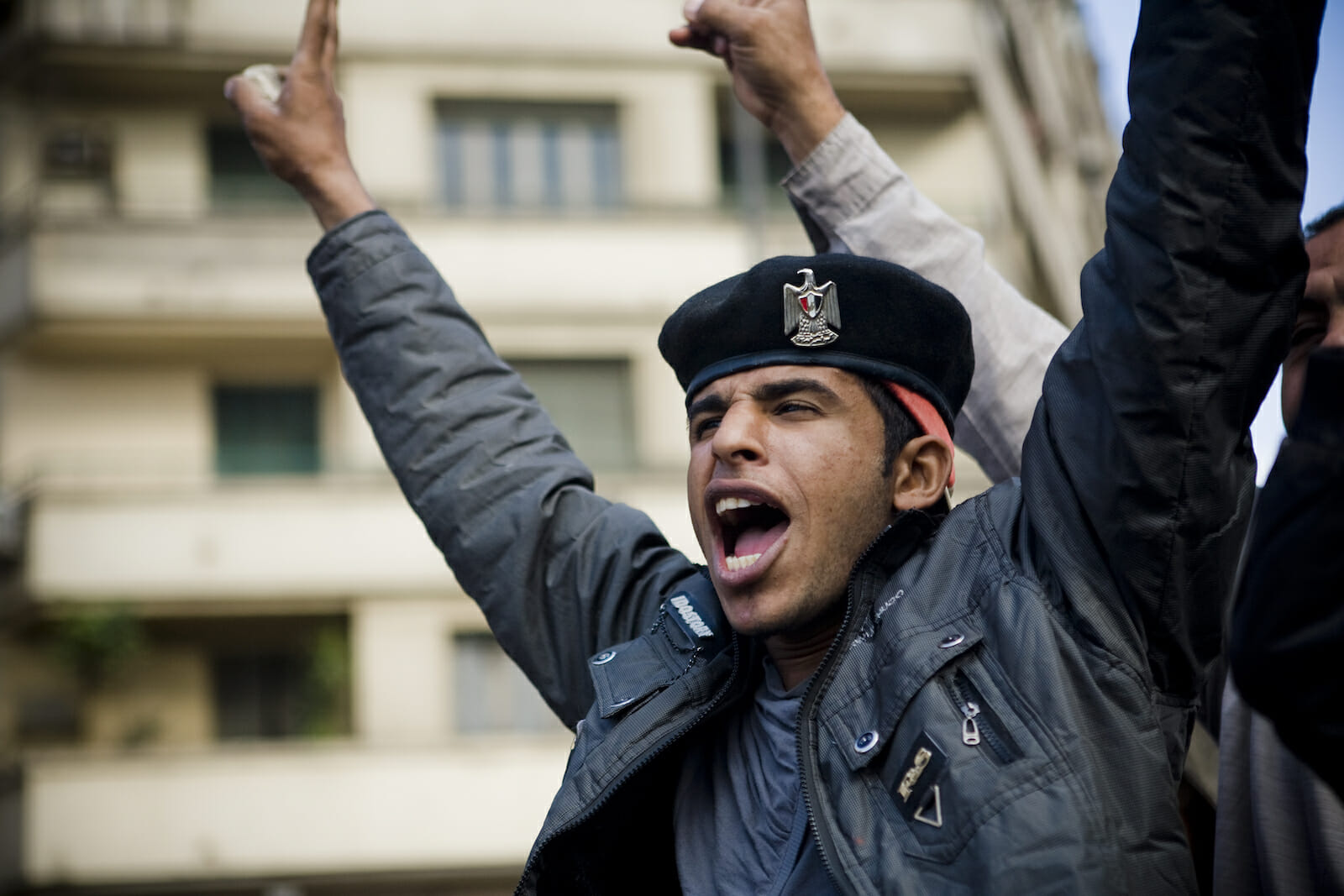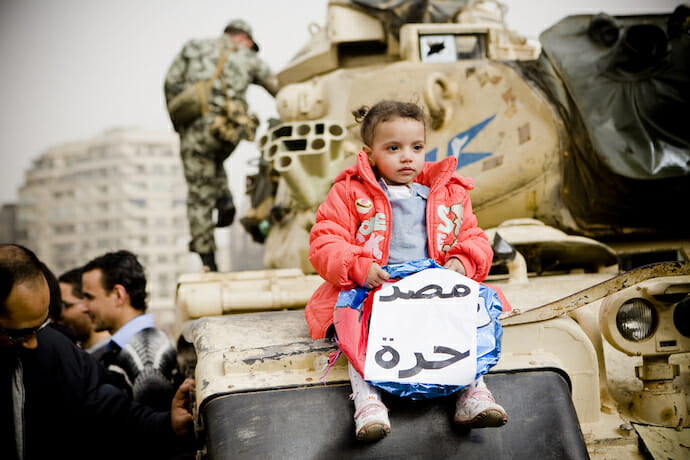
The ABC of Egypt and Western Hegemony
Since the popular uprising of 25 January, 2011, protestors have not just challenged the figureheads of the old regime, but the very fundamental power structure upon which Hosni Mubarak’s dictatorship had been built. For thirty years, the army, bureaucrats and capitalists collectively formed an oppressive alliance against any kind of social justice, economic equality and political freedom for ordinary people.
Alongside the military’s collaboration with the ruling classes at home, its strategic alliance and subservience to the US crucially facilitated the dictatorship with economic and political survival. Protestors and activists continuing to revolt against the Supreme Council of the Armed Forces, (SCAF) are not just challenging the authority of the military junta. In reality, they are directly confronting the whole state apparatus – the army, the corrupt bureaucrats, the rule of capital and US hegemony alike. The underlying power structure still being used by the current regime to preserve both its own economic and political privileges and those of its neo-colonial masters is being violently shaken to the core.
The revolutionary voices being expressed in political discourses, informal forums, in slogans, on placards, banners and even in the graffiti sprawled across the cities clearly illustrates how protestor’s aims go beyond electoral reform and parliamentary democracy. People are also seeking social reform: improved healthcare and housing, better education, equal employment opportunities, labour rights, independent trade unions and a higher minimum wage which has not changed for twenty-seven years. People want judicial reform, constitutional changes, an end to military tribunals and the trial and conviction of those guilty of crimes both under the former dictatorship and the current regime. They are pushing for press freedom and an independent media. They want changes in foreign policy such as a renegotiation of the 1979 Peace Treaty with Israel.
Whilst these demands are wide ranging, they are neither vague nor vacuous. These are well-articulated political goals which inescapably intersect the economic and social fabric of Egyptian society. They reflect the aspirations of people who continue to be deprived not just of political freedom, but also of socio-economic justice.
This is not to say that all the objectives of those seeking reform are necessarily common or united. What this reveals is how the initial unity witnessed earlier this year in Tahrir Square, that cut across class, religion, age, urban-rural and gender divisions is now taking a varied meaning. The unified goals of ‘democracy,’ ‘freedom’ and ‘dignity’ now represent a set of differing and often competing class interests.
Fundamentally, this reflects the reality of a population of 83 million people, where more than 20 million live in absolute poverty and another 20 million who live very close to a poverty line of $2 a day. A country where institutionalised corruption is rife, income inequality is huge, the unemployment rate is at 11.8%, where the inflation rate hovers between 9-12% and food prices have soared 20% in the past year alone.
It is against this backdrop that we can fully appreciate why so called “free and fair” elections engineered by the military rulers will not bring about social justice and democratic reform. Why Egypt’s military junta far from functioning as an agent of democratic change is indeed the very enemy of democracy itself and why the West has no desire to bring about real democracy any more than the regime. For the last ten months, like his authoritarian predecessor, Field Marshal Mohamed Hussein Tantawi has done everything in his power to obstruct democratic reform.
SCAF has broken its pledge to hand power to a civilian government after six months of taking power. It has refused to lift the state of emergency law and placed almost 12,000 civilians under military tribunals. In October this year, it barbarically crushed to death twenty-eight protesters during the Maspero riots. It has continued to brutally use the army and state police to violently suppress dissent by killing and injuring thousands. It has stifled labour rights by passing a law to criminalise strikes and it has hijacked the constitutional process. Considering the entire unelected military council is made up of loyal aides to the former dictator including Tantawi himself, it is not surprising.

To all intents and purposes SCAF is a mere extension of Mubarak’s dictatorship, yet the western ideological narrative continues to place great faith in the military rulers as the guardians of the revolution who will deliver democracy. US Secretary of State Hillary Clinton is still hooting on about an “orderly transition to democracy” which should continue in a “just, transparent and inclusive manner.” In the week prior to the farcical parliamentary elections which began on 28 November, 2011, despite one of the largest and most violent protests calling for an end to military rule, on 30 November, 2011 Clinton remarked, “I congratulate the Egyptian people for a peaceful, successful start to their election process.”
In light of the violent uprising just days before, in which more than forty-two people were killed and thousands injured by the regime using US made ammunition and tear-gas, the statement epitomises US neo-imperial arrogance. In a similar vein, British Foreign Secretary William Hague stated that whilst the deaths and injuries of protestors were “of great concern,” the military should continue to “oversee the elections.” This rhetoric only serves to conceal Western hegemonic interests in Egypt and the Middle East at large.
Egypt forms a key tool of US hegemony in the region and US strategic interests in the region crucially include keeping ‘peace’ with Israel. Since Anwar al-Sadat’s signing of the US sponsored Peace Treaty with Israel in 1979, Egypt’s dictatorships have annually received around 1.3 billion USD of military aid. SCAF still continues to be bankrolled by this US military aid and for the fiscal year 2012, an amount of 1.5 billion USD has been allocated. The intimate relationship between the US and Egyptian military is such that many top army officers study and ‘train’ in US military academies. Over the years the military has been generously rewarded through aid and debt relief in return for supporting US-Israeli led wars in the region. These include the Gulf War which began in 1990, the continued Israeli war against Palestine and Israel’s war on Lebanon in 2006.
These are all wars which have been opposed by the overwhelmingly majority of the Egyptian public and heightened resentment against the regime’s alliance with US and Israeli terror. In May this year, Tahrir Square witnessed tens of thousands people expressing their solidarity with Palestinians commemorating Nakba Day.
SCAF however, has not changed its foreign policy towards the US or Israel and it has reiterated its commitment to the Israeli Peace Treaty despite public opinion being to the contrary, both among secularists and Islamists. Whilst in the early days of the uprisings we did not witness US and Israeli flag burning, Tahrir Square is now laden with such anti-Israeli and anti-US sentiments. It is not a coincidence that the gas pipeline to Israel via which Egypt has supplied gas at below market prices has been bombed at least ten times this year and people are demanding gas exports to Israel be stopped. Nor is it a coincidence that the Israeli Embassy in Cairo was attacked this September and the end of November Suez port workers refused to take delivery of US made tear-gas. People want to be free of US domination and are challenging an army functions as an “agent” of US hegemonic power protecting Israeli terror.
Despite these foreign policy challenges faced by the regime, the loyal fiddler it seems is still playing the tune of those who pay him.
Moreover, Western hegemonic interests in Egypt are not limited to political and military strategy. These also decisively coincide with capitalist interests and the global domination of neo-liberal economic policies. Egypt’s path to ‘free market’ liberalisation initially began with Sadat’s ‘infitah’ (openness) policies which invited foreign and local private capital to begin dominating the economy. This transformation was accelerated by Mubarak under the direction of the International Monetary Fund (IMF). Terms and conditions of the IMF credit, particularly under the Structural-Adjustment Programme initiated in 1990s included the removal of agricultural subsidies, relaxing price controls, a massive reduction in spending on social services, privatisation of state-owned industries and large sections of the public sector such as healthcare. These measures resulted in the eviction of tenant farmers, a very rapid rise in unemployment, deteriorated working conditions and lower standards of living which pushed many millions more below the poverty line.
This creation of a local capitalist class which amassed wealth at the expense of exploiting ordinary workers has and still is intrinsically linked to the state. Those who benefited from the privatisation schemes included army officers, state officials and individuals politically connected to the regime. Many of them are the very army generals still in power and former National Democratic Party (NDP) currently running for election. The liberalisation process was further facilitated by corrupt bureaucrats who allowed the sale of assets at below market prices to both ruling classes at home and multinationals abroad. The government even reduced the higher rate of taxation from 42% to 20%. The rising socio-economic inequality which directly resulted from regime’s draconian neo-liberal policies has been one of the key factors continuing to give momentum to the popular uprising.
Indeed it is often forgotten, or rather conveniently omitted from the Western narrative of the revolution that it was the general worker’s strikes ranging from the Suez Canal, to textile mills, to the public sector which decisively tipped the scales for Mubarak’s ousting.
The Egyptian military’s own business ventures include the ownership of land, property and commercial businesses accounting for up to 25% of the economy. The military remains an integral part of the systematic economic exploitation. It is not a ‘neutral,’ democratic institution and by consequence can never serve as an agent for democracy change to rule in the interests of all classes of people equally. It is now deliberately delaying the handing of power over to a civilian government in order to ensure that the army is will able to exert power over a future elected government if and when it decides to exit. SACF is carefully controlling the constitutional reform to that effect. Last month in a controversial document which outlines the ‘constitutional principles,’ it made a provision which allows the military to appoint 80 of the 100 members of the planned constitutional assembly. In the case that the first assembly is not able to come to an agreement on a constitution within six months, the army retains authority to appoint a new one. Protestors boycotting elections see through this façade which will in practice mean that the army will not just protect the country, but still continue to rule it as well.
The army is by default an opponent of democracy. Whilst it will concede to some reform, it is not in the army’s interest to allow any structural change to its power base which is decisively supported by the US. Thus, SCAF has allowed cosmetic change and limited concessions to the demands of political activists. Since the start of the revolution political groups such as The April 6 Youth Movement have vehemently called for all old NDP candidates from Mubarak’s regime to be disqualified from running for election and be tried in courts. After ten months, SCAF issued a statement on 21 November, 2011 to that effect, knowing that many of the old NDP members are standing for election only a week away. In practice this amounted to a mere hollow gesture. Elections where people are ‘free’ to vote, but their choices have already been undermined are neither ‘fair’ nor ‘free.’ They are meaningless.

